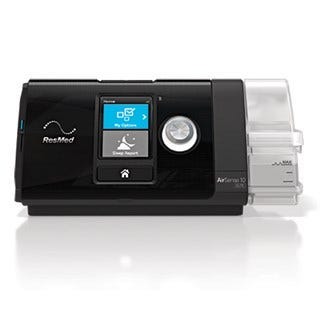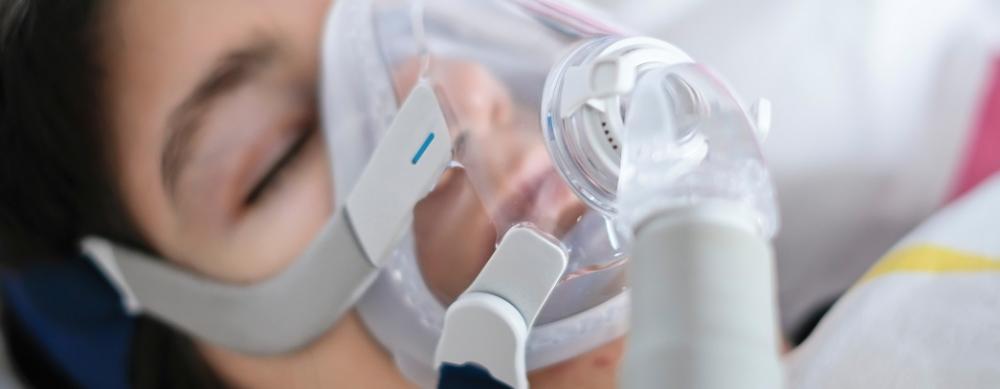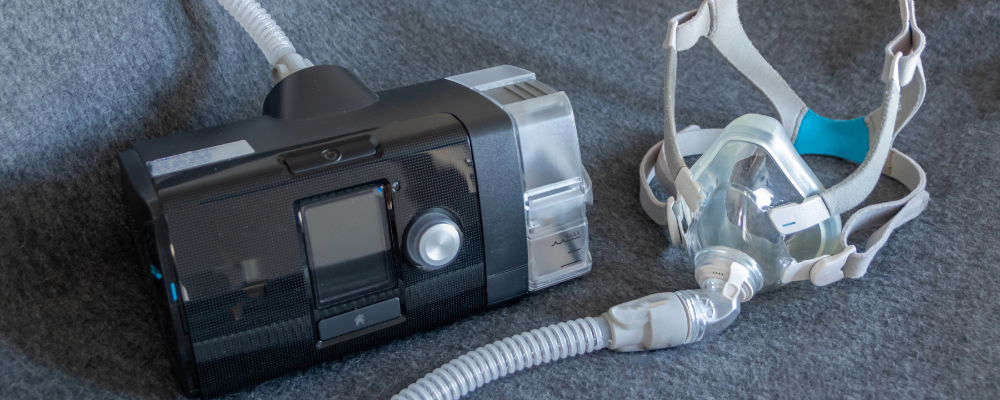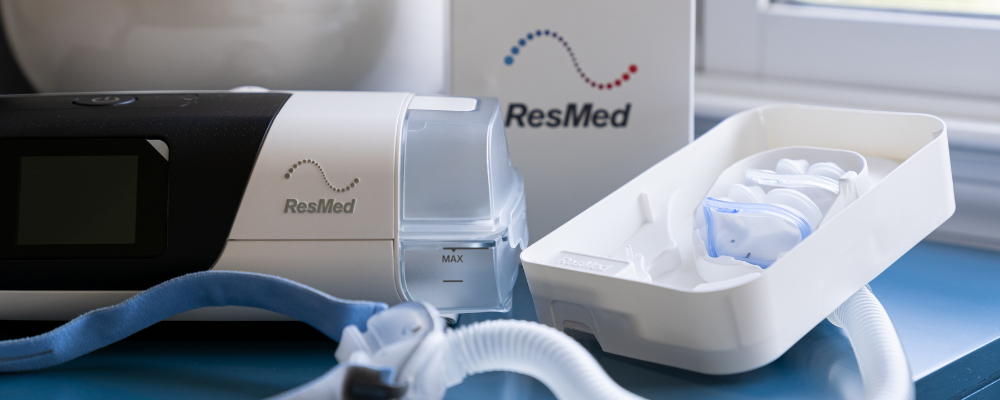When you’re first diagnosed with Sleep Apnea the process of getting a CPAP machine can seem daunting. Do you need to spend a night in a sleep lab? Can you just get your prescription from your primary care physician? Where’s the best place to buy a CPAP?
Take a deep breath! We’ve written this guide to simplify the process of getting a CPAP prescription and getting your new CPAP machine.
Table of Contents
How to Get a CPAP Machine
Thanks to advances in technology– like home sleep apnea tests and telemedicine appointments– getting a CPAP machine has never been easier! But even if you buy your CPAP equipment online, there’s still a process you have to follow to ensure you’re getting proper sleep therapy.
To summarize, you’ll need to:
- Have a Sleep Study
- Get a Prescription
- Choose the Right CPAP Device
How to Get a Sleep Study
If you suffer from restless nights, unfulfilling sleep, and daytime drowsiness — and particularly if you’re a known snorer — there is a strong possibility that you may have obstructive sleep apnea.
However, in order to confirm that diagnosis, and to rule out other sleep disorders, your doctor will first need to order a test called a polysomnogram or polysomnography– more commonly known as a sleep study.
If the sleep study shows that you have obstructive sleep apnea, your physician can then write you a prescription for a machine that provides continuous positive airway pressure (CPAP) or bilevel positive airway pressure (BiPAP) while you sleep.
But if the thought of spending the night in a lab gives you anxiety, you’ll be glad to know your doctor can also order a home sleep study!


Is a Home Sleep Study as Good as a Sleep Lab for Sleep Apnea Diagnosis?
It’s true that an overnight evaluation at an accredited sleep center remains the gold standard for an obstructive sleep apnea diagnosis. There you’ll be connected to multiple hoses, tubes, and wires that will monitor your heart rhythm, brain waves, breathing rate, and airflow while you sleep. An in-lab sleep test offers the most accurate and comprehensive assessment of your condition, and can tell the difference between Obstructive Sleep Apnea (OSA) and Central Sleep Apnea (CSA).
However, recent advances in sleep medicine allow a less invasive option for those who suspect they may have apnea: an unattended sleep test that you take in the comfort of your home.
A home sleep test can be done in your own bed, and involves considerably less hardware, while the results are clinically reviewed and reported directly to your physician.
There are advantages and disadvantages to each test, so you should discuss with your doctor which is appropriate for you. For some patients, a home sleep test will be enough to diagnose your apnea and allow a doctor to write you a prescription for a CPAP machine. However, for others, a home sleep test will sometimes need to be followed by standard polysomnography.
How to Get a CPAP Prescription
Once your sleep test confirms a diagnosis of sleep apnea, getting a prescription for the proper machine is simple. Any qualified provider with a valid license can write you a prescription for a CPAP, including your:
- Primary care physician (MD or DO)
- Psychiatrist
- Dentist
- Nurse Practitioner (NP)
- Physicians Assistant (PA)
In some cases, a clinician or sleep specialist may be able to read your home sleep test results remotely and, if appropriate, write you a prescription for a CPAP machine.
While several websites allow you to get your CPAP prescription online based on a questionnaire, this should NOT be the path you follow. Your CPAP prescription needs to include a pressure setting that’s specific to your healthcare needs and based on your sleep study results. Remember that a CPAP is a medical device and your life may depend on it.
What Does My CPAP Prescription Need to Say?
Your CPAP prescription determines what you’re allowed to purchase, so you’ll need to make sure you’re on the same page with your sleep physician.
Your prescription will need to include:
- Your name
- Your physician's name and contact information
- Your specific diagnosis
- The type of CPAP machine (CPAP, APAP, or BiPAP)
- Your pressure setting (or pressure range)
- An expiration date
Your CPAP prescription may also include a recommendation for CPAP mask type (full face, nasal, or nasal pillow) and a replacement schedule for your CPAP supplies.
If you want to include a humidifier, your prescription should include that too!
Why Do I Need a Prescription For CPAP?
It may seem like a hassle, but requiring a prescription helps to protect your health. Using a CPAP on the wrong pressure setting– or worse, using a CPAP if you don’t have sleep apnea– can be dangerous.
Having to go through a medical doctor or healthcare professional helps ensure that your pressure settings are tailored to you, and that your sleep therapy is effective.
And it’s actually gotten easier with time. In 2018, the FDA lowered the classification of PAP machines from Class III medical equipment to Class II medical devices.


When To Speak to Your Doctor
Your sleep issues may stem from something other than sleep apnea, but with the high prevalence of obstructive sleep apnea in the United States and globally, it is certainly worth investigating. Your internist, pediatrician, or family physician should be the first step in this investigation, as he or she is best equipped to evaluate your complaints and make the proper referrals and/or write the prescriptions you’ll need for further testing and potential treatment.
The actual sleep apnea diagnostic criteria primarily depends on the technical findings from your polysomnography. However, some common symptoms that may indicate a hypopnea or apnea issue include loud snoring, daytime sleepiness, and (especially) periods of breathing cessation observed by a third party while you sleep.
Your risk for sleep apnea may be increased by obesity, high blood pressure, advanced age, and male gender. If you believe you may be suffering from undiagnosed obstructive sleep apnea, or are having trouble getting a good night’s rest, it is important to discuss this with your doctor immediately.
Self-care is essential, and getting enough quality rest is no exception. Untreated obstructive sleep apnea can seriously hinder your health. Conversely, successful CPAP therapy can make a world of difference. By following the guidelines above on how to get a CPAP prescription, you will have taken the first step toward a better night’s sleep and a more productive waking life.
Where Can I Buy a CPAP Machine?
Once you’ve had your sleep test and you’ve got your shiny new prescription, you’ve got several options to choose from when buying your CPAP machine!
You can buy your CPAP at a brick-and-mortar store: It’s convenient to be able to see the machines in person, but their stock is usually limited.
You can buy your CPAP from an online retailer, but you’ll end up paying full price out-of-pocket.
Or you can save time and money with Aeroflow Sleep! We handle all of the hassle and paperwork for you!
When you sign up for Aeroflow Sleep, you’ll be matched with a personal Sleep Specialist. Your specialist will connect with your doctor to get your prescription on your behalf. Then they’ll work with your insurance provider to help you make the most of your insurance coverage!
Your dedicated Specialist can help you choose from a wide selection of CPAP machines from top names like ResMed, Fisher & Paykel, DeVilbiss and more. They can help you troubleshoot your settings, and even find the perfect fit for your CPAP mask. With Aeroflow Sleep, we’re with you at every step of your sleep apnea journey. Fill out our simple qualify form to get started!
References:
- Couple charged with illegally selling prescription medical devices. The United States Department of Justice. https://www.justice.gov/usao-ndga/pr/couple-charged-illegally-selling-prescription-medical-devices. Published January 30, 2018. Accessed October 31, 2019.
- Doyle K. Online marketplace offers cheaper CPAP machines without a prescription. Reuters. August 8, 2016.
- Find a Sleep Facility Near You. Sleep Education. http://sleepeducation.org/find-a-facility. Accessed October 30, 2019.
- Franklin KA, Lindberg E. Obstructive sleep apnea is a common disorder in the population—a review on the epidemiology of sleep apnea. J Thorac Dis. 2015;7(8):1311-1322. doi:10.3978/j.issn.2072-1439.2015.06.11
- Obstructive sleep apnea. Mayo Clinic. https://www.mayoclinic.org/diseases-conditions/obstructive-sleep-apnea/diagnosis-treatment/drc-20352095. Published June 5, 2019. Accessed October 30, 2019.
- Pinto VL, Sharma S. Continuous Positive Airway Pressure (CPAP). Treasure Island, FL: StatPearls Publishing LLC; 2018. https://www.ncbi.nlm.nih.gov/books/NBK482178/. Accessed October 30, 2019.
- Rundo JV, Downey R. Polysomnography. Handb Clin Neurol. March 2019:381-392. doi:10.1016/b978-0-444-64032-1.00025-4
- Semelka M, Wilson J, Floyd R. Diagnosis and Treatment of Obstructive Sleep Apnea in Adults. American Family Physician. https://www.aafp.org/afp/2016/0901/p355.html. Published September 1, 2016. Accessed October 30, 2019.
About the Author: Gary Rothbard, M.D., M.S., is a non-practicing physician with nearly 20 years of experience as a medical writer. He has authored or contributed to a wide variety of material related to healthcare — including manuscripts, abstracts, feature articles, flashcard sets, posters, blog articles, advice columns, advertorials, drug summaries, slide decks, study summaries, laboratory exercises, question banks, and textbook reviews — directed at diverse audiences, including students, clinicians, researchers, patients, and caregivers.
Information provided on the Aeroflow Healthcare blog is not intended as a substitute to medical advice or care. Aeroflow Healthcare recommends consulting a doctor if you are experiencing medical issues or concerns.










